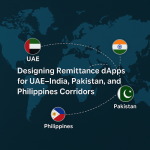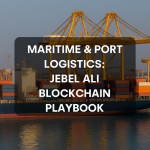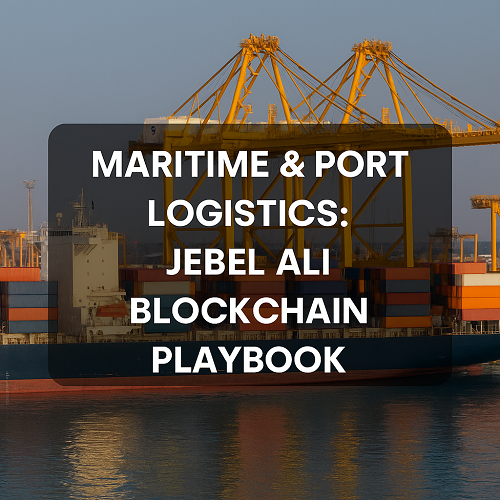Table of Contents
- Introduction
- Global Trends in Blockchain-Enabled Port Logistics
- Dubai’s Maritime Vision and DP World’s Digital Leadership
- Inside the Jebel Ali Blockchain Playbook
- Blockchain Across Shipping, Customs, and Documentation
- Case Study: Blockchain Integration in Jebel Ali Port
- Smart Contracts and Supply Chain Visibility
- Benefits and Efficiency Gains
- Dubai Customs Blockchain Platform and 2024–2025 Developments
- Challenges and Regulatory Considerations
- Future Outlook: Blockchain and Port 4.0 in Dubai
- Final Thoughts
- Websima Blockchain Solutions for Ports and Logistics
Introduction
Jebel Ali Port stands as the beating heart of Dubai’s global trade network — a critical link between Asia, Europe, and Africa. As container volumes surge and logistics chains grow more complex, digital transformation has become imperative.
Enter blockchain, the invisible infrastructure powering a new era of transparency, security, and operational efficiency. From customs clearance to cargo visibility, port logistics blockchain Dubai is redefining how trade moves through the region.
Global Trends in Blockchain-Enabled Port Logistics
: &
People, listen this is very important to consider. Because port employees need to understand that your job is not just about shipping products. We all know you will not have the courage to report what has been actually… pic.twitter.com/suSzYFBIPi
— ïʀɨɛʟ (@Prolotario1) October 2, 2024
Globally, ports handle over 80% of all traded goods by volume, according to UNCTAD’s Review of Maritime Transport 2024. Yet inefficiencies persist — paper-based documents, siloed data systems, and manual verifications remain widespread.
Blockchain resolves these gaps by creating a tamper-proof shared ledger where every event — container arrival, inspection, payment, or customs clearance — is recorded in real time.
While Rotterdam, Antwerp, and Singapore have piloted blockchain for container tracking, Dubai has leapfrogged into implementation. Its blockchain adoption is not experimental — it’s operational, linking DP World, Dubai Customs, and the emirate’s free zones under a unified data fabric.
Dubai’s Maritime Vision and DP World’s Digital Leadership
Under the Dubai Economic Agenda (D33) and the Digital Economy Strategy 2030, blockchain plays a central role in transforming logistics efficiency and trade transparency.
DP World, the operator of Jebel Ali Port, continues to lead this charge. In 2024, the company reported record cargo volumes — over 15.5 million TEUs — while expanding its CARGOES DataChain ecosystem to support secure data exchange across terminals (DP World, 2024).
The initiative integrates blockchain-based smart documentation, allowing port operators, freight forwarders, and customs authorities to access verified shipment data in real time. This harmonization eliminates duplicate entries, reduces delays, and strengthens regulatory oversight.
Inside the Jebel Ali Blockchain Playbook
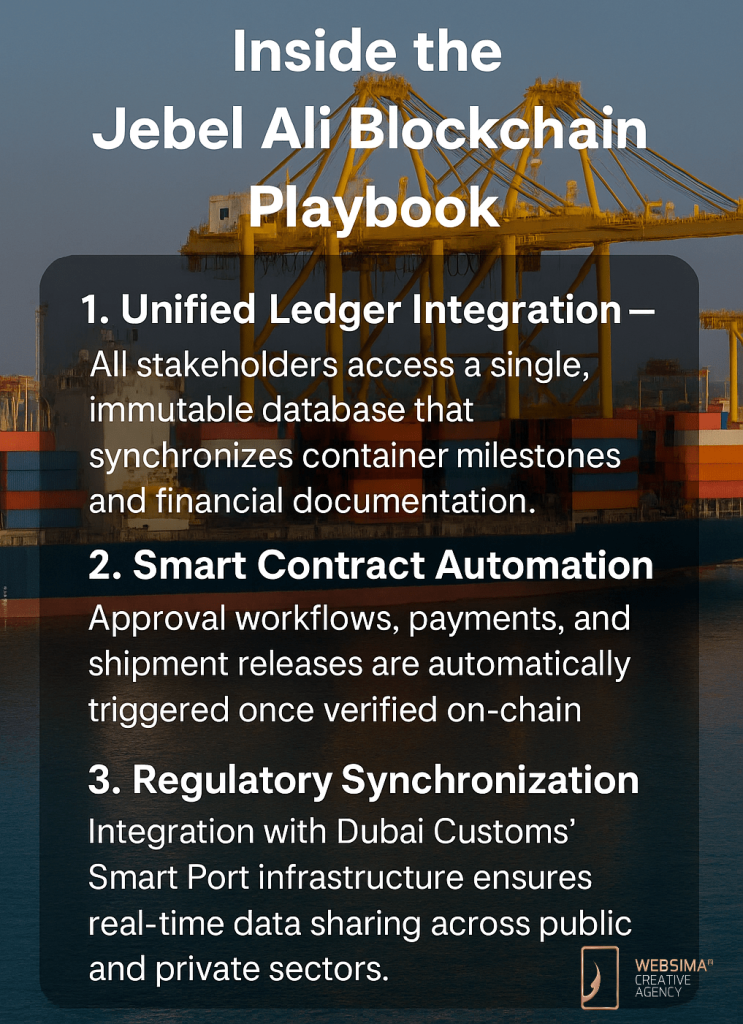
The Jebel Ali Blockchain Playbook centers on three foundational layers:
- Unified Ledger Integration – All stakeholders access a single, immutable database that synchronizes container milestones and financial documentation.
- Smart Contract Automation – Approval workflows, payments, and shipment releases are automatically triggered once verified on-chain.
- Regulatory Synchronization – Integration with Dubai Customs’ Smart Port infrastructure ensures real-time data sharing across public and private sectors.
This digital framework positions Jebel Ali as one of the world’s most advanced logistics ecosystems — capable of handling millions of containers with verified accuracy and near-zero manual reconciliation.
Blockchain Across Shipping, Customs, and Documentation
Blockchain is revolutionizing how Dubai manages logistics and customs operations:
Shipping and Cargo Tracking
Each container is logged on-chain the moment it enters the port. Every transfer, seal change, or handover is timestamped, reducing disputes over location and responsibility.
Customs and Clearance
In July 2024, Dubai Customs launched a blockchain platform to enhance transparency, cut clearance times, and support e-commerce trade (Dubai Media Office, 2024).
This system allows customs officers, shipping firms, and traders to share encrypted data, automate risk assessment, and accelerate cargo approvals — all while meeting Dubai’s Paperless Government mandate.
Trade Documentation
According to Gulf News, the blockchain platform secures bills of lading and certificates of origin, ensuring that trade documents cannot be falsified or duplicated.
Blockchain also eliminates courier dependencies, allowing instant, verifiable access to shipment documentation between trusted parties.
Case Study: Blockchain Integration in Jebel Ali Port
The Jebel Ali–DP World blockchain pilot connects terminal operators, customs systems, and shipping agents through a unified ledger.
Notable Outcomes:
- Processing time reduced by up to 40%.
- Enhanced transparency across supply chains.
- Fraud mitigation through immutable record keeping.
- Cross-agency collaboration enabling seamless customs and freight synchronization.
In early 2025, Cointelegraph reported that Dubai’s blockchain rollout has become part of its smart city transformation, directly improving the efficiency of the region’s largest logistics hub (Cointelegraph, 2025).
Smart Contracts and Supply Chain Visibility
Smart contracts are the operational engine behind blockchain in port logistics.
At Jebel Ali, smart contracts now handle:
- Automatic release of cargo once inspection reports are validated.
- Triggered payments between carriers, terminal operators, and customs authorities.
- Settlement of demurrage and insurance events based on on-chain timestamps.
By combining blockchain with IoT and AI, the port gains predictive visibility — enabling real-time decisions on routing, inventory, and compliance.
Benefits and Efficiency Gains
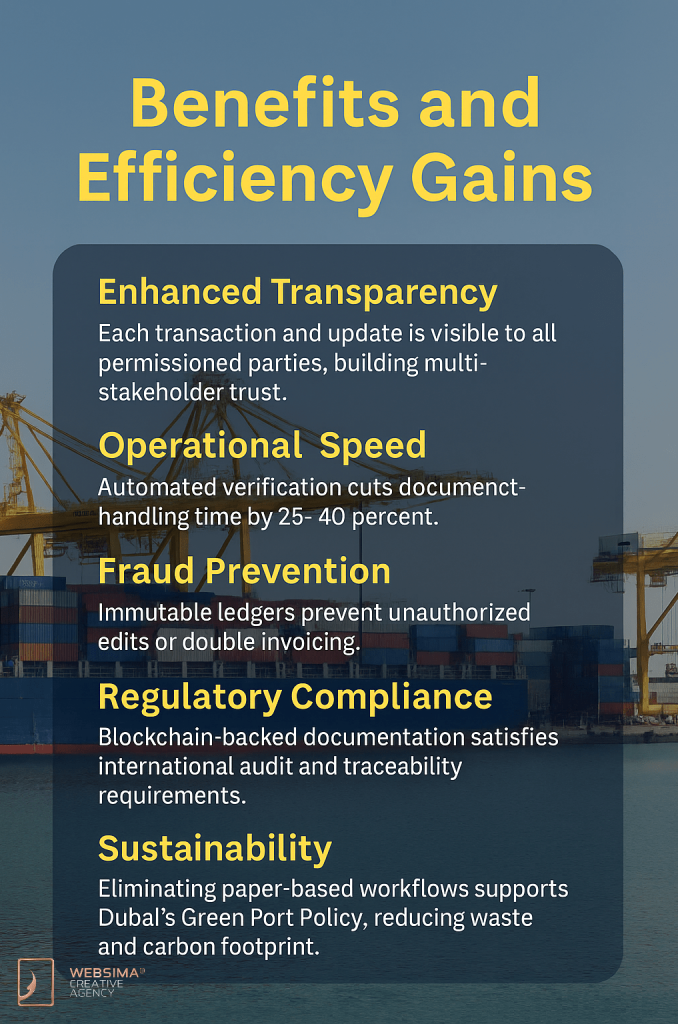
Enhanced Transparency
Each transaction and update is visible to all permissioned parties, building multi-stakeholder trust.
Operational Speed
Automated verification cuts document-handling time by 25–40 percent.
Fraud Prevention
Immutable ledgers prevent unauthorized edits or double invoicing.
Regulatory Compliance
Blockchain-backed documentation satisfies international audit and traceability requirements.
Sustainability
Eliminating paper-based workflows supports Dubai’s Green Port Policy, reducing waste and carbon footprint.
Dubai Customs Blockchain Platform and 2024–2025 Developments
Dubai Customs’ blockchain platform represents the first large-scale government-led deployment of its kind in the GCC.
A Cointelegraph feature (2025) and official Dubai Media Office press release (2024) confirm that blockchain now underpins data sharing between traders, couriers, and regulatory authorities.
By Q1 2025, The Economic Times UAE Desk highlighted that blockchain has strengthened data security, trade compliance, and e-commerce integration, forming the backbone of Dubai’s Smart Trade Ecosystem.
These initiatives extend beyond the port gates, integrating DP World’s CARGOES DataChain with Dubai Customs’ digital platforms — creating a seamless, paperless trade environment.
Challenges and Regulatory Considerations
Despite its success, several challenges remain:
- Interoperability: Connecting Dubai’s blockchain system with global customs networks requires standardized APIs.
- Adoption Resistance: Some freight forwarders still prefer traditional ERPs.
- Data Privacy: Managing permissioned access while ensuring transparency demands advanced encryption.
- Regulatory Coordination: Tokenized document recognition needs synchronized global legal standards.
The Virtual Assets Regulatory Authority (VARA) and Dubai Customs continue to test sandbox environments to refine blockchain governance and compliance frameworks. These standards also pave the way for blockchain-based procurement automation and milestone payments across public logistics and infrastructure projects.
Future Outlook: Blockchain and Port 4.0 in Dubai
By 2026, DP World aims to make Jebel Ali a fully blockchain-integrated Port 4.0 model, uniting AI, IoT, and digital twins.
With record 2024 throughput of 15.5 million TEUs, as confirmed by DP World, blockchain ensures scalability, accuracy, and resilience across massive trade volumes.
Dubai’s ambition is not limited to logistics efficiency — it seeks to export its blockchain port model regionally, positioning itself as the control center for global trade digitization.
As Jebel Ali advances toward Port 4.0, the convergence of blockchain with IoT sensors and smart infrastructure in Dubai’s logistics ecosystem will enhance data accuracy and real-time monitoring.
Final Thoughts
The port logistics blockchain Dubai framework demonstrates what happens when innovation meets policy alignment. Jebel Ali’s blockchain-driven ecosystem reduces friction, enhances security, and enables data-driven decision-making — all while reinforcing Dubai’s reputation as the region’s logistics capital.
As blockchain continues to evolve, the Jebel Ali experience will stand as the global benchmark for digital maritime transformation.
Websima Blockchain Solutions for Ports and Logistics
At Websima, we specialize in translating blockchain technology into real-world logistics performance. Our services include:
- Blockchain system design for port community platforms
- Smart contract programming for customs and trade automation
- Document tokenization and supply-chain identity verification
- Compliance with VARA, DMCC, and Smart Dubai regulations
Dubai’s ports are proving that data integrity and efficiency can coexist — and Websima helps businesses achieve both.
Contact Websima to explore blockchain integration for your logistics or port operation.
Build transparency, compliance, and speed into every container that moves.


